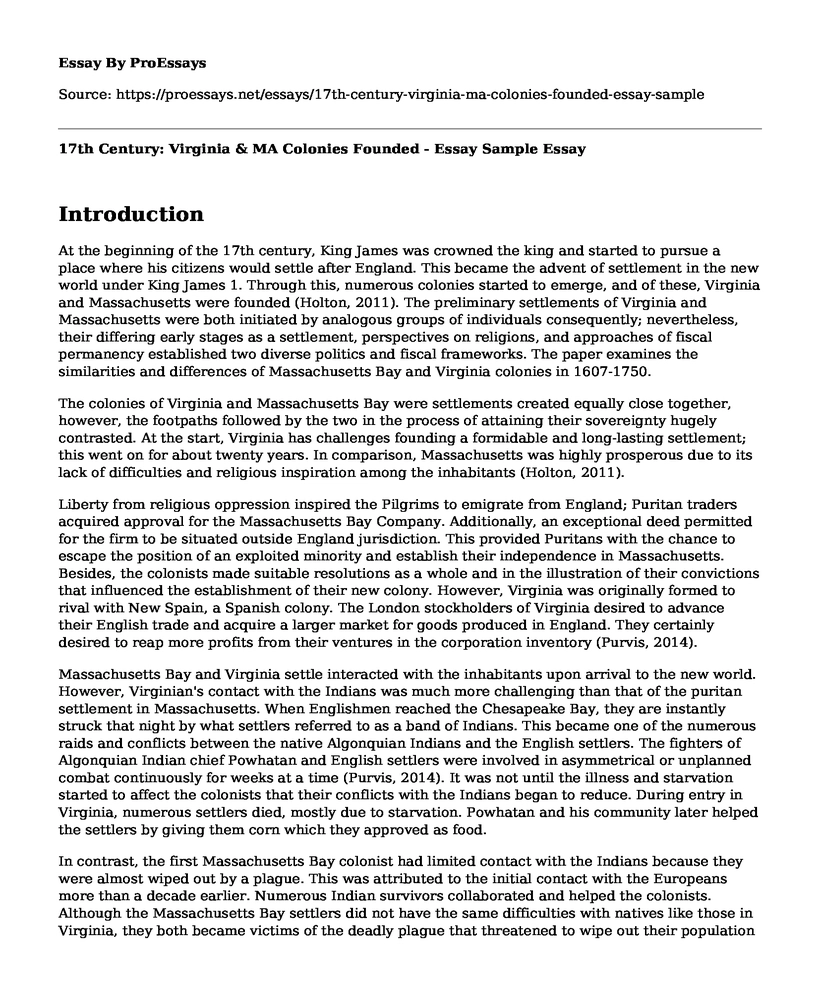Introduction
At the beginning of the 17th century, King James was crowned the king and started to pursue a place where his citizens would settle after England. This became the advent of settlement in the new world under King James 1. Through this, numerous colonies started to emerge, and of these, Virginia and Massachusetts were founded (Holton, 2011). The preliminary settlements of Virginia and Massachusetts were both initiated by analogous groups of individuals consequently; nevertheless, their differing early stages as a settlement, perspectives on religions, and approaches of fiscal permanency established two diverse politics and fiscal frameworks. The paper examines the similarities and differences of Massachusetts Bay and Virginia colonies in 1607-1750.
The colonies of Virginia and Massachusetts Bay were settlements created equally close together, however, the footpaths followed by the two in the process of attaining their sovereignty hugely contrasted. At the start, Virginia has challenges founding a formidable and long-lasting settlement; this went on for about twenty years. In comparison, Massachusetts was highly prosperous due to its lack of difficulties and religious inspiration among the inhabitants (Holton, 2011).
Liberty from religious oppression inspired the Pilgrims to emigrate from England; Puritan traders acquired approval for the Massachusetts Bay Company. Additionally, an exceptional deed permitted for the firm to be situated outside England jurisdiction. This provided Puritans with the chance to escape the position of an exploited minority and establish their independence in Massachusetts. Besides, the colonists made suitable resolutions as a whole and in the illustration of their convictions that influenced the establishment of their new colony. However, Virginia was originally formed to rival with New Spain, a Spanish colony. The London stockholders of Virginia desired to advance their English trade and acquire a larger market for goods produced in England. They certainly desired to reap more profits from their ventures in the corporation inventory (Purvis, 2014).
Massachusetts Bay and Virginia settle interacted with the inhabitants upon arrival to the new world. However, Virginian's contact with the Indians was much more challenging than that of the puritan settlement in Massachusetts. When Englishmen reached the Chesapeake Bay, they are instantly struck that night by what settlers referred to as a band of Indians. This became one of the numerous raids and conflicts between the native Algonquian Indians and the English settlers. The fighters of Algonquian Indian chief Powhatan and English settlers were involved in asymmetrical or unplanned combat continuously for weeks at a time (Purvis, 2014). It was not until the illness and starvation started to affect the colonists that their conflicts with the Indians began to reduce. During entry in Virginia, numerous settlers died, mostly due to starvation. Powhatan and his community later helped the settlers by giving them corn which they approved as food.
In contrast, the first Massachusetts Bay colonist had limited contact with the Indians because they were almost wiped out by a plague. This was attributed to the initial contact with the Europeans more than a decade earlier. Numerous Indian survivors collaborated and helped the colonists. Although the Massachusetts Bay settlers did not have the same difficulties with natives like those in Virginia, they both became victims of the deadly plague that threatened to wipe out their population (Holton, 2011). A similarity between Massachusetts Bay and Virginia is that the colonists had no interest in converting the Native Americans. They were beneficial in trading. Virginia region was prominent for its tobacco plantations which were established by John Rolfe. On the contrary, the Massachusetts Bay colony established towns where the economy was grounded on farming, hunting, fishing, and trading. An element for differentiation was the land and resources given to each region (Holton, 2011). The Virginia land was naturally more adapted to large scale farming compared to Massachusetts Bay.
The British colonists in Massachusetts wanted gold from Indian jurisdictions. This caused numerous deaths because the colonists focused on acquiring wealth rather than establishing a community and attaining food. This made the relationship between them and the Indians to deteriorate. The British settlers were more aggressive in New England and wanted the land and resources without the assistance of the Indians. On the other hand, Virginia region was much more civilized (Purvis, 2014). The Native Indians and the British settlers used each other's strength to become successful.
Conclusion
Conclusively, the British settlers in Massachusetts and Virginia were pursuing new opportunities and start in the form of religious freedom or land prospects. The settlers escaped England due to religious persecution. Virginia region was prominent for tobacco plantations while in Massachusetts Bay, the British settlers established towns mostly due to the farming and trading activities. The focus on indentured labor indicated that moderately few women settled in the Virginia region. However, the British colonists had no interest in converting Native Americans to their religion. Virginia's reception of the British was much more aggressive. They fought leading to casualties on both sides. However, Native Americans in Massachusetts Bay become friends with the settlers because they had been weakened by the plague.
References
Holton, W. (2011). Forced founders: Indians, debtors, slaves, and the making of the American Revolution in Virginia. UNC Press Books
Purvis, T. L. (2014). Colonial America to 1763. New York: Facts on File.
Cite this page
17th Century: Virginia & MA Colonies Founded - Essay Sample. (2023, Feb 13). Retrieved from https://proessays.net/essays/17th-century-virginia-ma-colonies-founded-essay-sample
If you are the original author of this essay and no longer wish to have it published on the ProEssays website, please click below to request its removal:
- The Influence of the United States Supreme Court on the Social, Political, and Economic History
- Reign of Gregory VII Questions and Answers Paper Example
- Annotated Bibliography: The Ending of Slavery
- The 1919 Shock that Secure the Black Vote: A Look at the Aftermath of WWI - Essay Sample
- Essay Example on The Twelve Greek Pantheons: Immortals of Greek Mythology & Religion
- Essay Example on 9/11: Flaws in Pre-Attack Response and Aftermath
- Essay Sample on Holocaust: Images of Suffering and Cruelty







